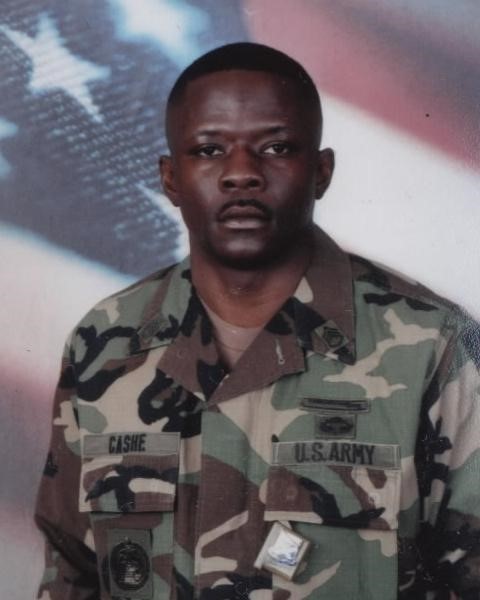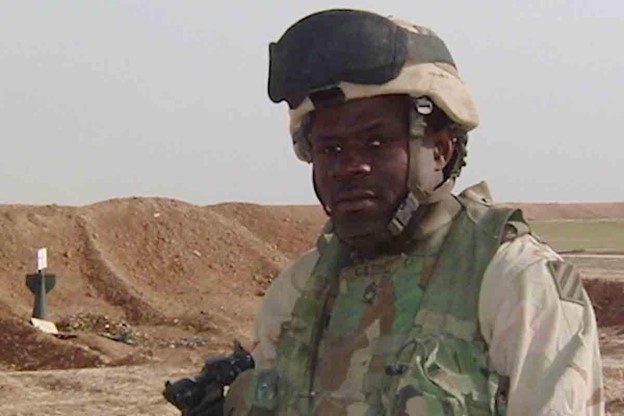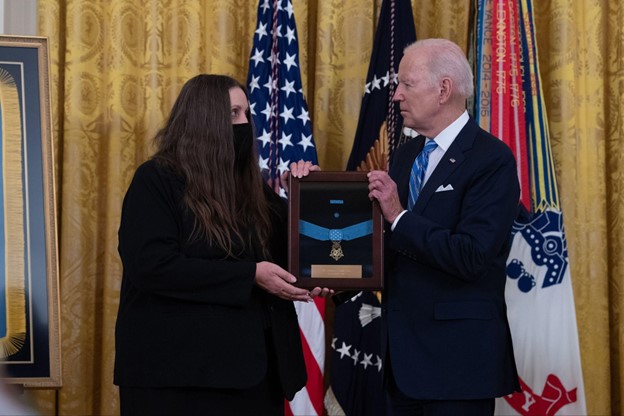Profiles In Courage: Sgt. 1st Class Alwyn Cashe

Alwyn Cashe personified everything the U.S. Army could possibly want in a Soldier. He was calm, cool, collected, and dedicated not just to the mission. He was dedicated to his men. That dedication would ultimately result in Sgt. Cashe gave up his life to save six others.
 Cashe was born into a poor family in Oviedo, Florida, in 1970. He joined the U.S. Army 1989 as a Supply Specialist, but by 1993, he was retrained as an infantryman. He served in the Army as a squad leader, a Drill Sergeant, and, ultimately, a Platoon Sergeant. His career included deployments in the 1991 Gulf War, the former Yugoslavia, and the 2003 U.S.-led invasion of Iraq. But his second deployment to Iraq in 2005 would forever cement his legacy.
Cashe was born into a poor family in Oviedo, Florida, in 1970. He joined the U.S. Army 1989 as a Supply Specialist, but by 1993, he was retrained as an infantryman. He served in the Army as a squad leader, a Drill Sergeant, and, ultimately, a Platoon Sergeant. His career included deployments in the 1991 Gulf War, the former Yugoslavia, and the 2003 U.S.-led invasion of Iraq. But his second deployment to Iraq in 2005 would forever cement his legacy.
On October 17, 2005, Cashe was deployed to Salah Ad Din Province, Iraq, with the U.S. Army's 3rd Brigade, 3rd Infantry Division. While on a nighttime mounted patrol near Samarra, his Bradley Fighting Vehicle was hit by an improvised explosive device (or IED), which ruptured the armored vehicle's fuel cell and sent diesel fuel all over the area. To make matters worse, the attack was part of an ambush, and small arms fire began crackling through the night air.
Covered in diesel fuel, Cashe could exit the vehicle, which caught fire and began to burn. His first move was opening the driver's hatch to help the driver escape the vehicle. When he opened the hatch, he found the driver badly burned and still on fire. Cashe helped get the driver to safety, put the fire out, and then ran back to the Bradley.
But there were still six of his Soldiers inside the Bradley, and all were trapped, burning as flames engulfed the entire vehicle. Under fire from the enemy, Alwyn Cashe ran to their aid. He helped open the troop door and pulled them out of the burning vehicle one by one, even as the diesel fuel on hi s own uniform caught fire.
s own uniform caught fire.
He helped lift four Soldiers from the wreckage, realized he was missing two, and then returned to retrieve them. The Iraqi translator died in the fire, but because of Cashe's bravery under fire and dedication to the men he called "my boys," none of his Soldiers died that night.
Reinforcements arrived to suppress the enemy attack, and a casualty collection point was soon established. Cashe's uniform had completely burned away, leaving him with second and third-degree burns over 72% of his body. When helicopters arrived to evacuate the wounded, Cashe stayed behind until all of his Soldiers were taken out first.
The wounded were all evacuated from the scene to Balad Air Base, where their wounds were treated. Along the way, Cashe asked repeatedly, "How are my guys? What's going on with them? Where are they at?" It was the same thing he asked after regaining consciousness at Brooke Army Medical Center in San Antonio. His first thought was always the well-being of his Soldiers.
 Cashe died weeks later, on November 8, 2005, at 35 years old. He was initially awarded the Silver Star for his heroism and dedication to his troops that night, but only because his battalion commander didn't realize the extent of Cashe's injuries that night and the excessive pain he must have experienced as he rescued his men.
Cashe died weeks later, on November 8, 2005, at 35 years old. He was initially awarded the Silver Star for his heroism and dedication to his troops that night, but only because his battalion commander didn't realize the extent of Cashe's injuries that night and the excessive pain he must have experienced as he rescued his men.
It took 16 years of constant effort, along with the help of three veteran members of Congress, but Sgt. 1st Class Alwyn Cashe's Silver Star was finally upgraded to the Medal of Honor. President Joe Biden presented the award to Cashe's wife, Tamara, in a White House ceremony on December 16, 2021.